SIFF Advance: MERCHANT IVORY
Directing: B
Writing: B
Cinematography: B
Editing: B+
How could I have gone this long, literally decades, without fully registering that Ismail Merchant, the producer half of the legendary filmmaking duo (and production company) Merchant Ivory, was an Indian man? I need to start paying attention! At this rate, I’ll never become a bona fide elegant gay elder of refined taste.
There was sure a lot of those at the SIFF screening of this film I just attended. This, I suppose, is one of the pitfalls of a documentary portrait of towering figures late in their lives: who else is left around to remember them? Or, at least, to remember their early days?
Ismail Merchant has been dead now for 19 years, having died in 2005, at age 68, after surgery for abdominal ulcers. Thus ended a personal and professional partnership with James Ivory—an American man born in 1928 who grew up in small-town Oregon—that lasted more than forty years. With Merchant producing and Ivory directing, much of the time also working with longtime collaborators writer Ruth Prawer Jhabvala and composer Richard Robbins, they made 44 films together.
A large number of them, of course, were British period films—the very thing they became most well known for, although they did make some films with contemporary settings. The most enduringly famous, however, included A Room with a View (1985); Maurice (1987); Howard’s End (1992); and The Remains of the Day (1993). Many years later, in 2018 James Ivory became the oldest person ever, at age 89, to win an Oscar, for his Adapted Screenplay for Call Me By Your Name, a film that really fits into the Merchant Ivory pantheon, particularly as an updated gay love story.
The gayness of it all is largely explored in this new documentary feature film, Merchant Ivory, directed and co-written by Stephen Soucy. He interviews Ivory himself extensively, inserts many clips of archival interviews with Merchant, and features a star studded array of other subjects from the duo’s storied film history: Hugh Grant, Helena Bonham Carter, Emma Thompson, a characteristically spitfire Vanessa Redgrave, as well as some of the writers and costume designers of the films, among others. There are also some notable absences, including Daniel Day-Lewis (hardly a surprise; he hasn’t given an interview to anyone in years), and Anthony Hopkins, who sued Merchant Ivory for unpaid wages after his performance in the 2009 film The City of Your Final Destination. It was the last of four Merchant Ivory films he was in.
Anyway, Maurice was a groundbreaking film in mainstream gay cinema, especially having come right after the success of A Room with a View. Many of the interview subjects discuss how rightly impressed they are by that accomplishment. Conversely, James Ivory himself is relatively cagey about questions regarding his sexuality—fairly frank in answering some questions, but somewhat evasive in others. Merchant Ivory is, at least in part, a fascinating portrait of a privileged sort of existence among gay men who once lived not exactly closeted, but as an open secret. Ivory and Merchant might as well have been a longtime married couple, but their relationship was not without volatility, with both of them (but evidently, especially Merchant) taking on other temporary lovers as time went on.
The thing about this documentary in particular, is it would qualify as a pretty niche interest. It’s for lovers of sophisticated period dramas, and for anyone interested in the subtle history of queerness in cinema. That does make for a Venn diagram with significant overlap. But outside of that, I’m not sure how much interest this film will hold, especially among younger audiences (and by “younger” I mean, say, younger than 50). Overall cinephiles may find it interesting.
I certainly did, and it compelled me to make a list of Merchant Ivory films I want to revisit, or see for the first time. I have only seen a handful, but of course only a select few would be considered essential in the oeuvre. That said, Merchant Ivory the documentary is fairly simple and straightforward, a compelling document but also mostly something to serve as a jumping-off point. The films they made have a sumptuousness that inherently makes them more interesting than the filmmakers themselves.
The powerhouse Hollywood couple you knew little about.
Overall: B

